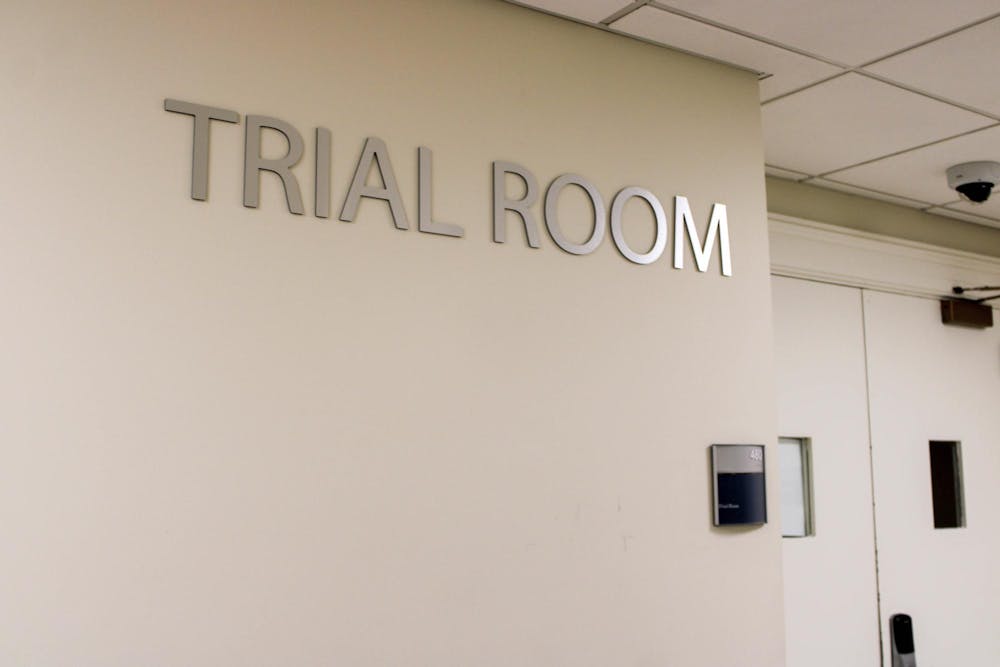Honor Committee representatives voted to remove procedural requirements to better align the Informed Retraction process with the current multi-sanction system during its Sunday meeting. The Committee also continued discussions regarding the development of a Faculty Reporting Guidebook intended to provide case statistics and reporting information for University faculty members.
The bylaw proposal, written by Cassidy Dufour, School of Law Rep. and Law student, and Jack Wallace, support officer and second-year College student, said that the current Informed Retraction process — wherein a student admits their guilt and agrees to make amends — places undue emphasis on an agreement of amends with the reporter of the honor offense and the alleged student rather than prioritizing the best method of amends for the alleged offender.
“[The agreement] over-emphasizes the reporter in the process of sanctioning,” Dufour said. “It leads the student to have no other [option] but to agree to what the reporters say, even if they disagree or have other feelings about what sanctions would be appropriate.”
After open discussion, the proposal passed with unanimous support from Committee members. A meeting between the reporter and alleged student will now replace the previous requirement for students and reporters to agree on amends before the sanctioning process begins.
Under this new amendment to the bylaws, reporters will now also be able to submit a Reporter Impact Statement detailing the effects of the offense and their proposed amends, which the Panel for Sanction will consider when determining an appropriate sanction.
“What we've created is eliminating that agreement requirement, but trying to also then have an amended meeting,” Dufour said. “There is some value in having that meeting face to face and taking accountability.”
The changes also clarify that a student may only submit one IR during their time at the University, reinforcing the expectation that an informed retraction represents a full recommitment to the Community of Trust.
The Committee also discussed the Faculty Reporting Guidebook, which was proposed at the last Committee meeting. According to Laura Howard, Committee chair and fourth-year College student, the guidebook will include analysis from the online case processing software and aims to provide faculty with clear statistics on case resolutions.
A broader discussion on reporting and data transparency followed, with Howard stressing the need to provide faculty with information on reporting procedures and to answer any questions that may arise regarding case statistics and the honor process.
“The theme [from faculty] is yes, how do I report?” Howard said. “But also, what is the climate on honor what have they been up to, because I haven’t followed up on it?”
The Committee ultimately decided to delay making any final decisions or recommendations during the meeting.
The Committee also briefly discussed the University-wide student self-governance elections involving both the Honor Committee and Student Council which were underway from Monday to Wednesday. The Committee is composed of a total of 30 representatives with two representatives from each of the 13 schools except the College of Arts and Sciences, which has five, and the School of Engineering and Applied Science, which has three.
The University Board of Elections, the body that supervises all University-wide student elections, emailed eligible students with their respective ballots Monday and students had until Wednesday to submit their ballot. According to UBE’s website, voting occured through the BigPulse online platform and will incorporate ranked-choice voting where students can rank candidates in order of their preference.
According to Howard, If there are not enough candidates to fill a school’s allotted number of seats on the Committee, then that school’s council will be responsible to fill the seat, whether through another election, appointment process or application process. Only 19 candidates across the University are running for the 30 seats on the Committee. However, in the College, there were 10 candidates running for its five available seats on the Committee.
Will Hancock, vice chair for the undergraduate community and third-year College student, Seamus Oliver, vice chair for investigations and third-year College student, and Margaret Zirwas, Committee member and third-year College student, are all ran for re-election within the College. The remaining seven candidates running for a seat on the Committee are hoping to represent the College for the first time.
According to UBE’s recorded election results, this year’s Committee elections within the College have been more competitive compared to last year when only seven candidates ran and two years ago when nine candidates ran.
The Committee was not sure if it would reconvene on the second Sunday of spring break, March 16, but Howard said that she would reach out to members to confirm if most would be back on Grounds in time for the meeting.







